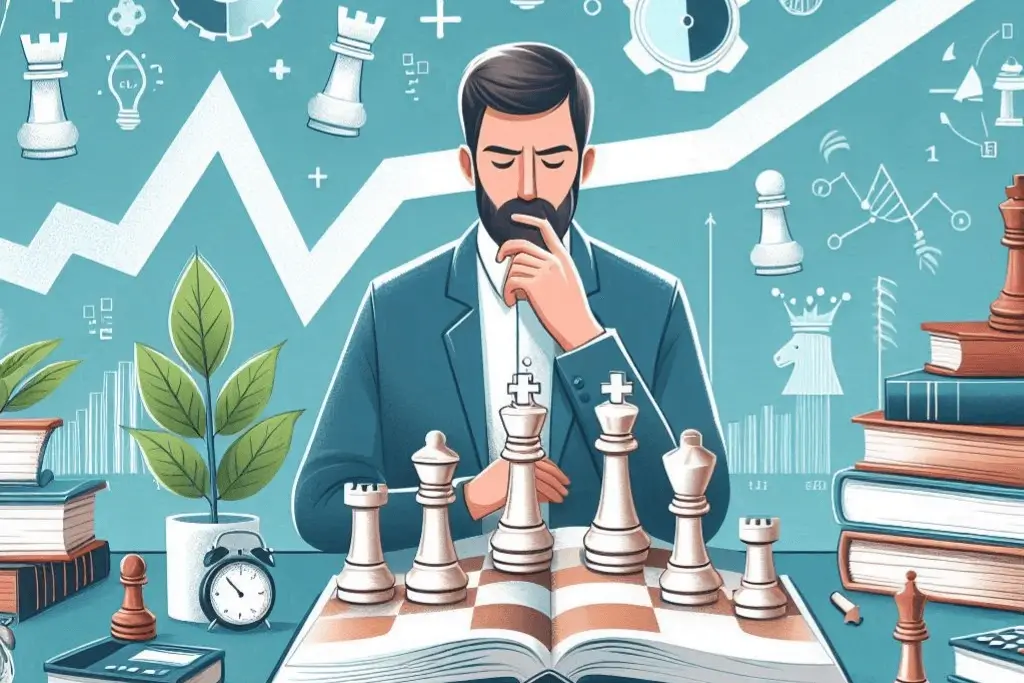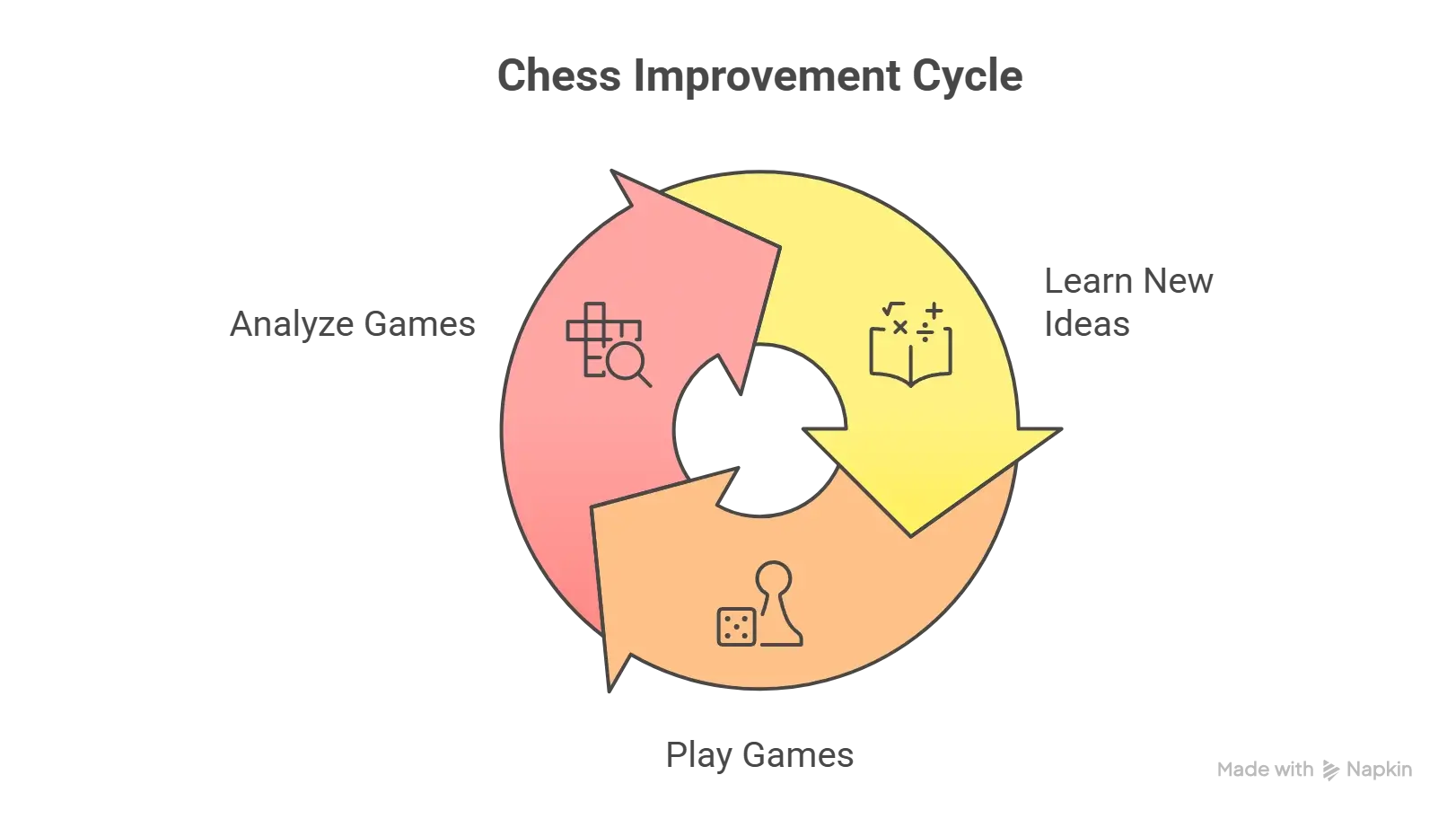Introduction
One of the most common questions chess players ask is: ‘How to get better at chess?’. Improving at chess doesn’t have to be complicated or overwhelming. At its core, it comes down to three simple but powerful steps: learning new concepts, playing games to put those ideas into practice, and carefully analyzing your mistakes to understand where you can improve. By cycling through these steps regularly, you build a solid foundation that helps you grow steadily as a player – whether you’re just picking up the game or already have some experience under your belt.
In this blog post, we’ll take a closer look at each of these essential steps. You’ll discover practical tips, useful resources, and clear guidance to help you create a focused and effective training routine. With this simple plan, you can confidently work toward becoming a stronger, smarter chess player.

How to Get Better at Chess: Where to Start and What to Choose
The first step to getting better at chess is learning new ideas. Thankfully, there are more resources than ever to help you do that. You can learn from chess books, online platforms like Lichess and Chess.com, video courses, YouTube channels, or by working with a coach.
Not all learning materials are created equal, though. Some are excellent, others not so much. And even good content won’t help if it’s too advanced – or too basic – for your current level. That’s why choosing the right material is so important. You want something that matches your needs and challenges you just enough to grow without becoming overwhelming.
If you enjoy studying from books, I’ve written a full blog post with tips on how to do that effectively, plus a list of recommended books for each level: How to Study Chess Books.
If you prefer video material, you might find my online chess courses helpful, or if you’re looking for personalized guidance, feel free to contact me.
From Knowledge to Action: How to Get Better at Chess by Playing
Learning chess theory is just the start – real improvement happens when you take those ideas to the board. Playing games is how you put what you’ve learned into practice. It’s the moment where theory meets reality.
Whether it’s online blitz, longer classical games, or casual face-to-face matches, every game gives you a chance to test your knowledge, make decisions under pressure, and experience the flow of the game firsthand. This practical experience helps you understand chess concepts on a deeper level and prepares you to face new challenges.
Remember, the goal isn’t just to win every game but to practice applying what you know, explore different positions, and gradually improve your decision-making.
Analyzing and Fixing Mistakes
Playing games is important, but to truly get better, you need to fix your mistakes. This means analyzing your games carefully to understand where you went wrong and how to avoid similar errors in the future.
There are many ways to analyze your games online. Websites like Lichess and Chess.com offer free tools that show you computer evaluations and point out mistakes or missed opportunities. These tools are great for spotting tactical blunders and understanding key moments.
For deeper insight, hiring a coach can be invaluable. A coach can review your games with you, explain strategic errors, and help you build a plan to improve specific areas of your play.
You can also share your games on online chess forums or communities. Other players often provide helpful feedback, different perspectives, and advice that you might not have considered.
The key is to be honest with yourself and learn from every mistake. Fixing those mistakes is what turns practice into real progress.
Repeat the Process: Learn, Play, Analyze
Improving at chess isn’t a one-time effort – it’s a continuous cycle. You learn new ideas, play games to practice them, then fix your mistakes by analyzing those games. Then, you start all over again.
This cycle helps you build strong habits, deepen your understanding, and sharpen your skills step by step. Each time you repeat it, you bring new knowledge into your games and correct old weaknesses.
Consistency is key. The more you commit to this process, the faster you’ll improve. So keep learning, keep playing, and most importantly – keep fixing. Your chess will thank you for it.

Summary: How to Get Better at Chess
Getting better at chess takes time and effort, but by following the simple cycle of learning, playing, and analyzing your mistakes, progress is within reach for every player. Choose the right learning materials, put theory into practice on the board, and analyze your games to understand where you can improve. Repeat this process consistently, and you’ll see your skills grow steadily.
Remember, improvement is a journey – enjoy every step of it. If you want personalized support or structured training, feel free to reach out. Your next move toward becoming a stronger chess player starts now.
FAQs
1. How often should I study chess to see improvement?
Consistency matters more than long hours. Aim for regular, focused study sessions – 30 minutes to an hour a day is a great start.
2. What’s the best way to choose chess books or learning materials?
Look for resources suited to your current skill level. Start simple and gradually move to more advanced books or courses.
3. Should I focus more on playing games or studying theory?
Both are important. Theory builds your understanding, but playing games lets you apply it. Balance is key – learn, then practice, then analyze.
4. Can I improve without a coach?
Yes, many players improve on their own using online tools and self-study. But a coach can speed up progress by providing personalized guidance and feedback.
5. How do I effectively analyze my own games?
Start by reviewing critical moments – where you lost material or missed chances. Use online engines for tactical mistakes but try to understand the strategic reasons behind errors. Discussing your games with others can also help.
